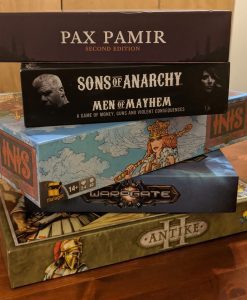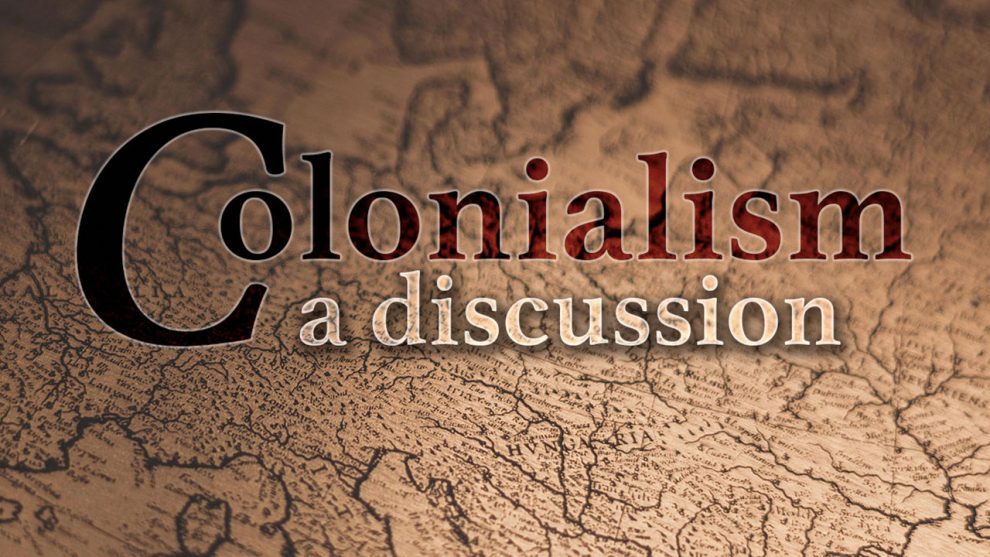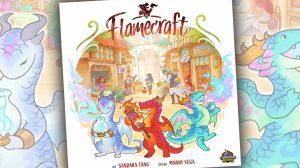Board game critic Dan Thurot (of SPACE-BIFF!) recently asked on Twitter about the difference between a review and criticism/critique.
I have the start of an answer to this question. I think this answer can also help lead into some more interesting questions (spoiler alert: We’re going to talk about colonialism today). But the question we need to discuss is this:
When we play games, what are we playing at?
The difference

A review, in my estimation, is advice about a purchasing decision. A review gives an overview of the features and whether or not they work. If I review a toaster, my review is intended to explain to other people why they should or shouldn’t buy that toaster. Does it toast properly? How long does it take to toast? How reliable is it in comparison to other toasters?
A critique, on the other hand, often becomes existential. Whereas a review pivots around the reviewer’s knowledge of a given object, the features expected of it and how well they work, a critique questions what those features are, where they come from, why they are there. A reviewer says: “This toaster toasts toast in 3.5 seconds.” A critic says: “Why must the toaster toast in 3.5 seconds? Is there something wrong with the expectations we put on toasters?”

The critic then goes on to answer that question (or doesn’t). The reviewer’s bread and butter lies in the world of features and effects, while the critic lives in questions, feelings, and tensions. Both are useful and valuable and can function as modes of artistic expression.
I think there is a confusion between the two in our hobby, and this confusion in part stems from not being able to articulate what games are. I think it is this confusion that allows for thoughtless caricatures of ideas, people, and places.
The confusion
There was a Game Informer piece a while back that talked about the psychological benefits of games, and how good ones resemble work: they grant autonomy, foster competence, and generate relatedness to the world around us. I’m no psychologist, so I’m distilling this into a simple line:
Games give the ideal feeling of work.
When we play, we get a feeling of meaning, of accomplishment. It’s not a big stretch for me to say that meaningful work and projects are essential components to human happiness. You might disagree, but that’s where I’ll be working forward from.

Games do this all the time. Agricola is about making your farm productive, feeding your family, and scoring points. There is an ideal that you work towards (if you’re playing the game in good faith). Race for the Galaxy is about building a janky engine that works just long enough to accomplish the goal of winning the game. Having to hold a project together at the seams when it’s inches from falling apart is a component of any good project (at least when you’re working with me).
When we review these games, we try to estimate how satisfying compared to other similar consumer objects these games are. How much of a dopamine squirt do we get from Agricola as compared to Caverna? How does the quick valuation puzzle of Chicago Express compare to Irish Gauge? How well does Inis compare to other area control games?
When we critique games, I want to ask what we are playing at.
So, what are we playing at?
Because colonialism is a hot button issue right now, let’s talk about that. There are more games than you can shake a first player token at that concern themselves with EMPIRE.
Twilight Imperium, Struggle of Empires, Pax Pamir, Tigris & Euphrates, Eclipse, Core Worlds, Civilization: A New Dawn, Colonialism, Endeavor, the list goes on and on.
They’re often referred to as 4X games (eXplore, eXpand, eXploit, and eXterminate). These games’ success and/or failure is often judged in our community based on how smoothly the experience runs, how much player downtime there is, how the pieces look, what the victory conditions are, and so on and so on.
But what are these games about? What are we playing at when we play them? The vast majority of the time, we’re playing at domination, kingmaking, arrangement of forces, violence–or more abstractly, we’re playing at power exchange. We’re manipulating and maneuvering through structures of power, using them, and being used by them.

I don’t see anything inherently wrong with this. Once again, idealized work. Most people don’t get to have the experience of absolute power, so getting to play at it is fun. The work of being an empire can be fun. Getting your friends together and beating them up in a way in which everyone has consented to is fine. It can often be therapeutic. But, if we’re going to consent to that particular set of exchanges, we also have to consider a few other things. Fortunately, a game is never only one thing.
When I wrote about Cole Wehrle’s sandbox experience Pax Pamir, I mentioned what was literally called The Great Game: A bunch of powerful white men getting together over a map and parcelling it up like it was a game, creating dividing lines across cultures that didn’t ask for them (Africa, India, and many others). That of course is not what you’re doing when you play Pax Pamir (nobody gets killed when you’re playing The Great Game: The Game).
History is full of nastiness. Colonialism birthed horrors that continue to plague our world today. Some people are and continue to be hurt by its effect, both tangibly and intangibly. Art and responsible history seek to reckon with aesthetic and political reality in myriad ways.
So, if we’re going to call games art, and we’re going to critique that art, we have to ask serious questions about games that scrub away the nastiness in favor of making a palettable consumer object. Mombasa may be a great consumer object, but its “it’s a fantasy” ideology is repellent to me. When a game uncritically engages with the exercise of power over the powerless it deserves critique. As a critic, it’s my job to point that out. We don’t get to have our fun without entailments unless we’re going to box ourselves up inside our cardboard.
If your game is about colonizing Africa, you’d better engage with the nasty stuff too, because here in The Critic House of Thomas, we ask why enslaved and murdered people are presented as happy little worker bees.
It’s just a game?
Words matter, and the words we use to create and color our lives create and color our games and game experiences, and nobody is exempt from being thoughtful and compassionate when it comes to our hobby. That goes for anybody who wants to call themselves a critic. There isn’t any ground to stand on if your only defense is “don’t mess with my fun.”
Consumer objects are consumer objects. They’re things that are bought and sold. I’m not here to critique capitalism. I am here to ask questions about art, what it says and does, and how it affects our hobby.
It’s a pretty vapid hobby if all we’re doing is flipping switches, placing workers, and pressing buttons.











Interesting piece!
The challenge I see, from a design perspective, is that unless the game’s incentive structures are specifically built around rewarding the ‘morally upright’ behavior, a game that tries to show us the messy parts of history will ultimately just have the effect of dividing players into those that can abstract themselves from the roles they inhabit, and those that can’t. And those that can will probably tend to win more often.
As a case in point, consider a variant to Puerto Rico, which is the same in every way but for two changes: the discs are now called “slaves”, and the Mayor is called “The Slave Trader”. Is this game better than PR, and if so, in what way is it better?
There are a number of publications examining the intersection of the board game hobby and its usage of a heavily edited (i.e. cleansed) world history. This one was a particularly thought-provoking read:
https://www.nytimes.com/2019/08/01/style/board-games-cancel-culture.html
As a commercial product that targets a fairly small demographic (boardgames are still no where near as popular or lucrative as video games), any critique of the game content or perceived messaging must always consider the unavoidable fact that the majority of these games were designed by western, caucasian males for western, caucasian players. Although the field of designers is becoming more diverse, it is likely to be an evolution rather than a revolution.
That said, I’m not sure that an abstraction primarily meant to entertain rather than educate can reasonably be held to a high standard of social awareness. Perhaps the consumer can demand an application of historical accuracy, but that places an incredible burden on the designer to imbue their creation with a sense of responsible stewardship while not discouraging the audience from wrestling with the abstracted but harsh realities of exploration, expansion, exploitation and extermination. Most players probably don’t want to spend their leisure time confronting the uncomfortable truth that the legacy of some rather brutal colonial expansions continue to provide them some disproportionate socioeconomic benefits many years hence.
Cole Werhle is the designer of An Infamous Traffic, a game that takes players through the morally corrupt machinations of opium traders in China who attempt to accumulate the most wealth so that they may break into London’s high society as respectable nobles. It is a fascinating game, in no small part because Mr. Werhle obtained his PhD by discussing “how the experience of empire altered the way British writers imagined distances of time and space during the early and mid 19th century” [from BGG]. I can’t think of another designer with this type of background who has the capacity to approach a difficult subject with the right balance of respect and creativity, and then successfully commercialize what is by its very nature a difficult subject. Pax Pamir 2nd edition is a more approachable game, which displays Mr. Werhle’s expertise in designing an experience that allows one to navigate The Great Game as locals rather than opportunistic colonial administrators (and this edition lacks the awkward editorial from Phil Eklund which defends the darkest parts of British colonialism by promoting the benefits imparted upon the undeveloped world).
I play games primarily for their entertainment value, and do not rely upon them as tools by which to calibrate my own inner, moral compass. But I would be remiss to deny that my own taste in games has changed as I’ve listened to others criticize their most offensive elements.
Shut Up & Sit Down managed to shame me out of ownership of Cards Against Humanity when they issued a scathing review that acknowledged the open racism, misogyny and crude humor contained therein. They’re right, at least to a degree, but I still miss David Bowie riding in on a tiger made of lightning. I exchanged my slave cards in Five Tribes for the less offensive Fakirs. There was even a backlash about the “Free Meat” card in Wok Star, which depicted a dog and cat and was felt to reinforce racist stereotypes about Chinese restaurant owners. The most recent edition has removed it.
Oh my gosh, this has run on for far longer than I intended.
The boardgame Renaissance doesn’t apply only to the numerous titles published with each passing year, but to the players as well. Sophisticated games that address mature subjects can only prosper in a market populated by increasingly sophisticated players who welcome designs that challenge tropes and unipolar historical perspectives. And as we think about games-as-art and the self-reflection it produces, some of the games in my collection will leave it because I see the world differently now.
Except Memoir ’44. Killing Nazis never goes out of style…
I, too, threw my copy of CAH in the trash after seeing the SUSD video. I’ve never been one to shy away from beyond-inappropriate humor because I also welcome harsh humor at my own expense. But that video changed me. I also saw an NPI video that discussed colonialism in games and once again the video really made me think. I thought Pax Pamir (2ed) looked like a great game, and I’m really liking what I see in the John Company 2ed Kickstarter. I just don’t know if I can be comfortable with it, though. I have many Indian and Pakistani friends & coworkers and I often wonder what they would think of such games. Most likely, I’ll never purchase either of these games – but I’m still very conflicted about them and others like them. I also feel some of the sentiment of Ben Lawson’s reply below yours – I full recognize the horrors inflicted upon people but would never do it myself. It is just game – or is it?
I love Mombasa because its such a fun game. We all know about the horrors of colonialism. I personally know and work with the Tutsi and FDLR in North Kivu DRCongo. I talk with people who have lost loved ones due to, essentially, the after effects of Leopold’s nightmarish actions. In the example of Mombasa, I know Pfister isn’t trying to be insensitive or promote white supremecy. There is no need to try to feel guilty on behalf of others. It’s a game, and an innocent one at that (I would argue). If I tried I’m sure I could find some sort of fault with nearly every game out there, but to what end? I understand that in today’s political climate this is a hot topic, it’s just frustrating that it’s now leaking into the boardgame hobby when traditionally it was how I escaped such things.
These games are children/adult toys, let’s not forget that. It IS just a game. They aren’t expressionistic pieces waiting for the walls of the Louvre.
“It’s a pretty vapid hobby if all we’re doing is flipping switches, placing workers, and pressing buttons.”
That is exactly what we are doing, and it’s fun! It’s definitely not a vapid experience for me and mine!
Either way interesting read.
In Pax Pamir, you actually play as local tribal leaders or warlords caught in the middle of the power struggle between Russia and Britain. You choose whose pawn you are, whether it’s for one of the invaders or for your own people. So Pax Pamir subverts the traditional perspective of colonization games by putting players into the shoes of those affected by it. Fascinating.